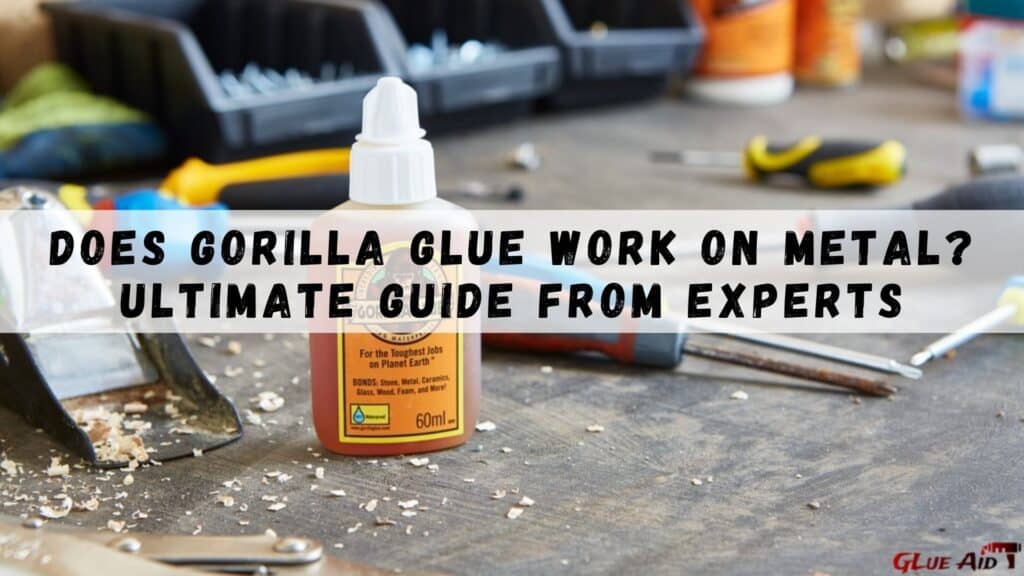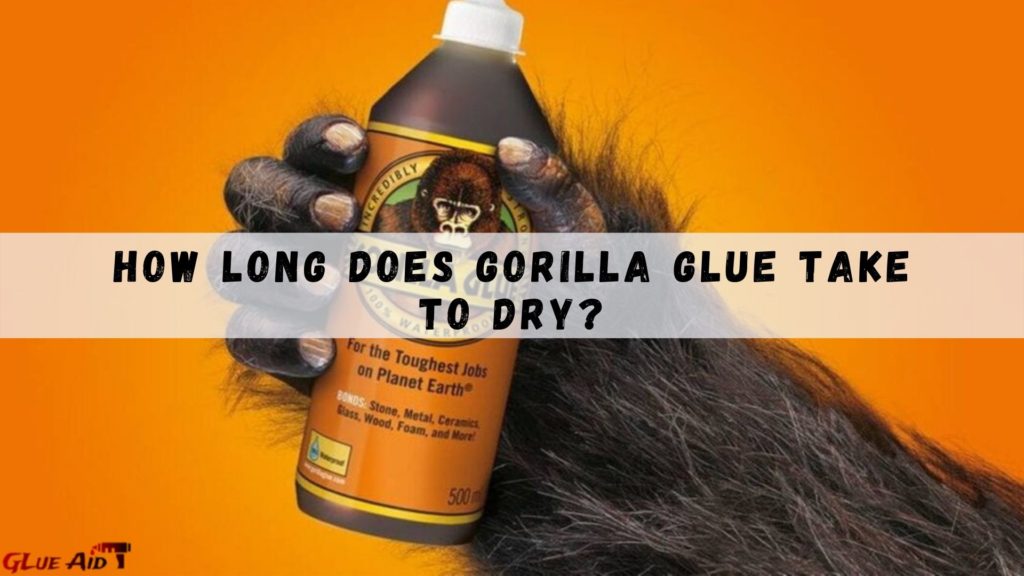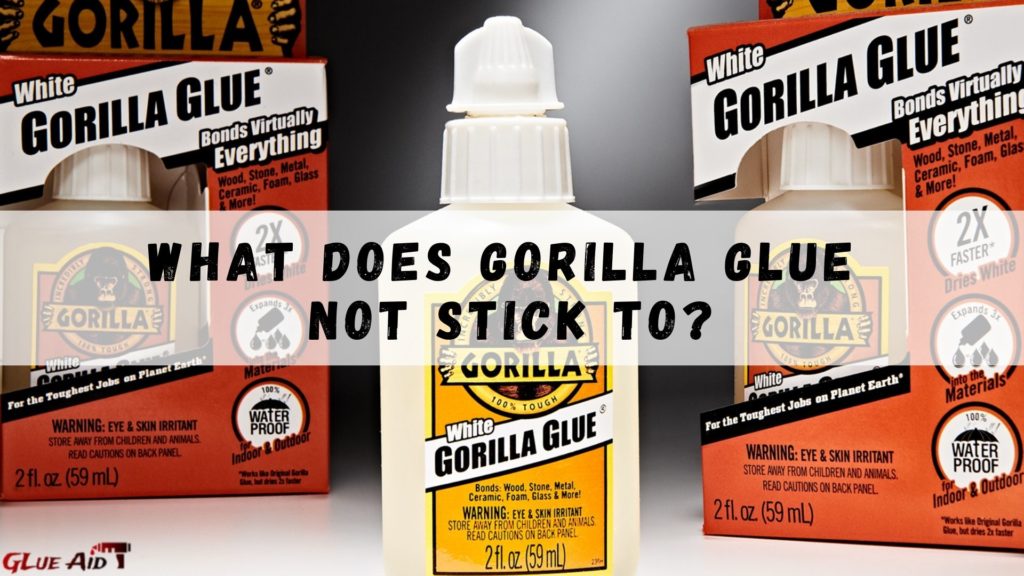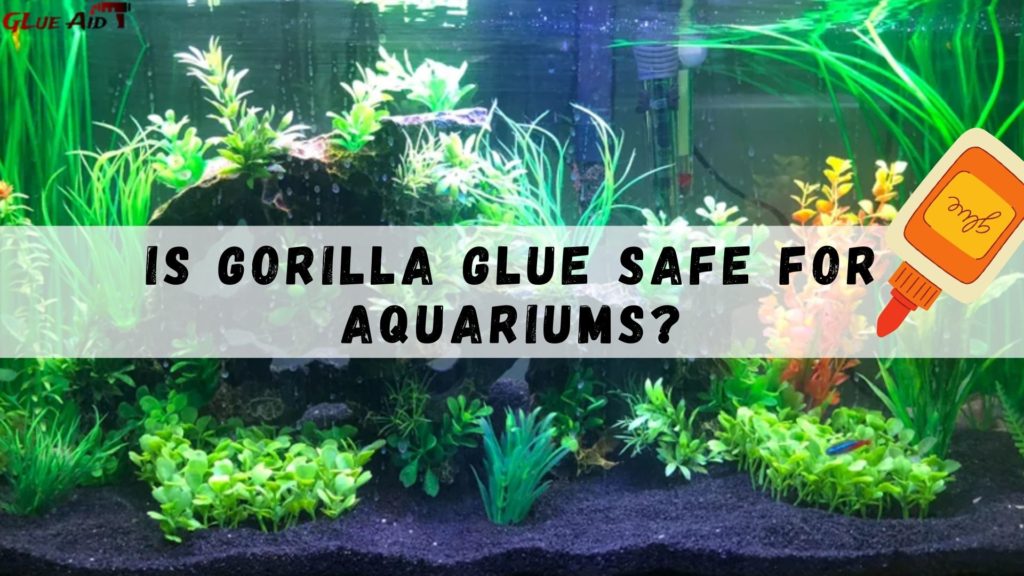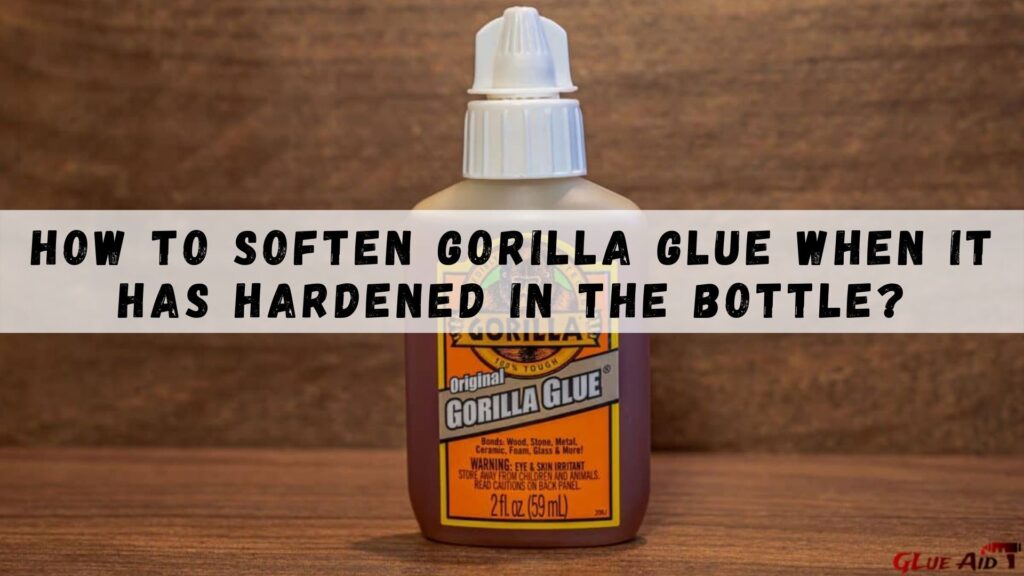There are a few problems that can occur when trying to attach metal. One is that the metal can be too slick for adhesives to grip. Another issue is that different metals can have different reactivities to adhesives.
No one glue is perfect for every project, and that includes Gorilla Glue. This multipurpose adhesive is known for its ability to bond a wide variety of materials, but does gorilla glue work on metal? Let’s find out this question answer in detail.
Table of Contents
Does Gorilla Glue Work on Metal?

Gorilla Glue can bond metal surfaces together. However, the strength of the bond may vary depending on the type of metal being glued. For example, Gorilla Glue is likely to work best on ferrous metals such as steel, while bonding with non-ferrous metals such as aluminum may be more difficult.
In order to get the strongest bond possible, it’s important to clean both surfaces well before applying the glue. Also, make sure that both pieces are aligned properly before pressing them together. gorilla glue will set in about 20-30 minutes, so be patient and allow it to cure fully before using the bonded object.
Read Also: How to Glue Metal to Glass
How Well Does Gorilla Glue Work on Metal?
Gorilla Glue is a popular adhesive that is known for its strength and bonds to a wide variety of surfaces. It is made from an acrylic polymer and polyurethane resin. Gorilla Glue can be used on metal, but it is not recommended for use on aluminum.
The fumes that are released when Gorilla Glue is curing can cause corrosion to the aluminum. When using Gorilla Glue on metal, it is important to clamp the pieces together until the glue has fully cured.
How to use Gorilla Glue on Metal Effectively
Gorilla Glue is a great adhesive for bonding metal surfaces together. It is especially effective in creating a strong bond between two pieces of metal. When using Gorilla Glue on metal, be sure to follow the instructions on the bottle.
First, make sure the surfaces to be glued are clean and dry. Apply Gorilla Glue to one surface and press the two surfaces together. Hold them in place for several minutes until the glue sets.
Testing the Adhesive Ability of Gorilla Glue on Different Types of Metal

When it comes to adhesives, Gorilla Glue is a household name. But what happens when you try to use Gorilla Glue on different types of metal? In this article, we’ll be testing the adhesive ability of Gorilla Glue on different types of metal to see how well it holds up.
We’ll be using three different types of metal: aluminum, steel, and copper. For each type of metal, we’ll be testing both the Gorilla Glue and the Gorilla Glue with the accelerator. We’ll also be testing the bond strength of each glue by breaking the bond between the metal and the adhesive.
The results were surprising! The Gorilla Glue with accelerator performed best on all three types of metal, creating a strong bond that was resistant to breaking.
Can Gorilla Glue Work on Metal to Metal?

Gorilla Glue is a polyurethane adhesive designed for bonding wood, metal, plastic, and other materials together. It is known for its impressive strength and durability. However, there has been some debate over whether or not Gorilla Glue can be used to bond metal to metal.
There are a few things to consider when trying to use Gorilla Glue on metal-to-metal joints. The first is that the surfaces of the metals need to be clean and free of any oils or debris. The second is that you need to use an appropriate amount of glue; too much or too little will not produce the desired results. Finally, you need to give the glue time to set before putting any stress on the joint.
If you follow these guidelines, Gorilla Glue can be an effective way to bond metal surfaces together.
Read Also: How To Glue Metal To Concrete
Advantages of using Gorilla Glue on Metal
Gorilla Glue is a polyurethane adhesive that bonds metal to metal, as well as other materials. It is waterproof, and will not corrode or rust. It can be used on a variety of surfaces, including wood, plastic, glass, and metal.
Gorilla Glue sets in just minutes and forms a bond that is both strong and durable. It can withstand extreme temperatures and is resistant to solvents and moisture. Gorilla Glue is also non-toxic and safe for use around children and pets.
Disadvantages of using Gorilla Glue on Metal
Gorilla Glue is a popular adhesive for bonding metal surfaces. However, there are some disadvantages to using Gorilla Glue on metal.
One is that the glue can be very difficult to remove after it dries. Another disadvantage is that Gorilla Glue can cause corrosion on metal surfaces.
Tips for using Gorilla Glue on Metal
There are a few things you need to keep in mind while gluing metal through gorilla glue.
First, make sure that the surfaces you are bonding are clean and dry. Metal can be particularly difficult to glue because it is a very slick surface.
Second, use a clamp or some other means of securing the glued surfaces together while the glue dries. This will help ensure a strong bond.
Finally, give the glue plenty of time to set before trying to use the joint. 24 hours should be more than enough time.
Factors to Consider When Gluing Metal
When it comes to gluing metal, there are a lot of factors to consider. The first is the kind of metal you’re using. Some metals are easier to glue than others. Aluminum is often easy to glue with many adhesives, while steel can be more difficult.
The second factor is the type of adhesive you’re using. There are many different types of adhesives, but not all of them work on metal. Gorilla Glue is one adhesive that does work on metal. It forms a strong bond and can withstand a lot of stress.
However, before you use Gorilla Glue on metal, you should do a test patch to make sure it works well with your material. Apply the adhesive to a small area and let it dry completely. Then test the bond by trying to pull the pieces apart.
FAQs About Does Gorilla Glue Work on Metal
What Gorilla Glue is best for metal?
GorillaWeld is a strong and extremely durable steel epoxy. The pump has a 4250 PSI bond strength, and it works in only 10 minutes. GorillaWeld is waterproof and can bond with a wide variety of materials, including metal, plastics, concrete, ceramics, PVC, fiberglass, and more.
What is the strongest glue for metal?
There are a variety of glues that can be used for metal, but the strongest is epoxy. This adhesive is created by combining two compounds, epoxide, and polyamine, which react with each other to form a hard, durable bond. Epoxy is especially well-suited for use on metal because it is resistant to both heat and chemicals. It also dries relatively quickly, making it a good choice for repairs that need to be done in a hurry.
What does Gorilla glue not stick to?
Gorilla glue is not water-soluble, so it does not stick to water or wet surfaces. It is also non-toxic, so it is safe to use around children and pets. Gorilla glue is a polyurethane adhesive, so it bonds well to most surfaces, including wood, metal, glass, and plastic. However, it should not be used on rubber or vinyl surfaces, as it can damage them.
What glue holds metal together?
The atoms that make up a metal are held together by a type of glue called a metallic bond. This type of bond is formed when the metal atoms share electrons. The electrons are able to move freely between the atoms, which allows the metal to be malleable and ductile.
How strong is Gorilla Glue on metal?
The bond between Gorilla Glue and metal is very strong. Gorilla Glue is a cyanoacrylate adhesive, which forms a very strong bond with metals. The bond is so strong that it is difficult to break.
How do you stick two pieces of metal together?
There are a few ways to stick two pieces of metal together. One way is to use a welding torch to heat up the metal until it is red hot and then use a welding rod to join the two pieces of metal together. Another way is to use a soldering iron to melt the solder onto the joint between the two pieces of metal. Lastly, you can use metal glue to stick two pieces of metal together.
Conclusion
If you’re looking for a strong adhesive that will work on metal, Gorilla GorillaWeld Glue is a great option. It bonds to a wide variety of surfaces, including metal, and forms a durable, waterproof bond. Gorilla Glue is also non-toxic, making it safe to use in a variety of applications.
Always ensure proper safety while using glue on metal. It’s a very good practice to use glue on small portions and wait to see the result. If your glue passes the test gluing then you can use it in your project without worrying.
Relevant Resources:
